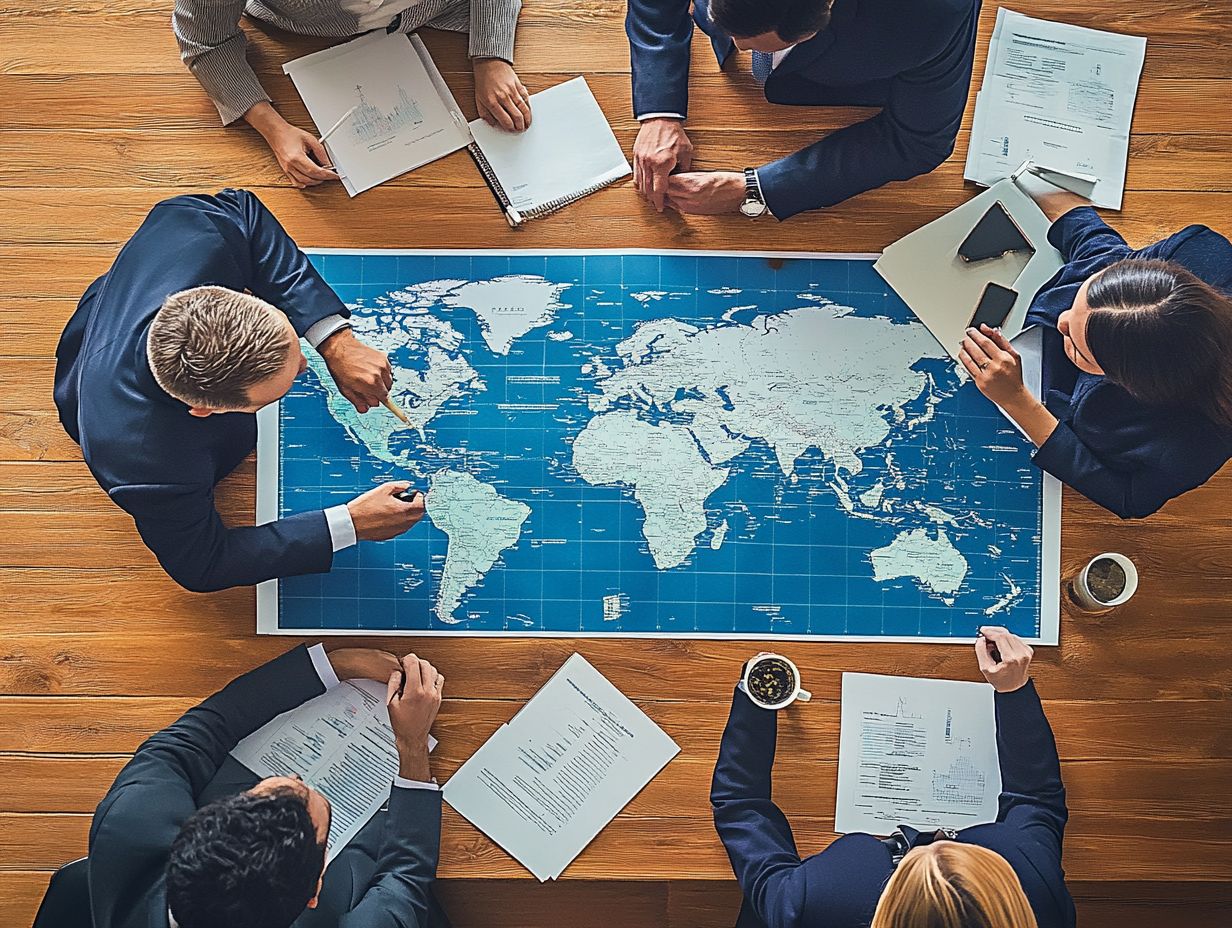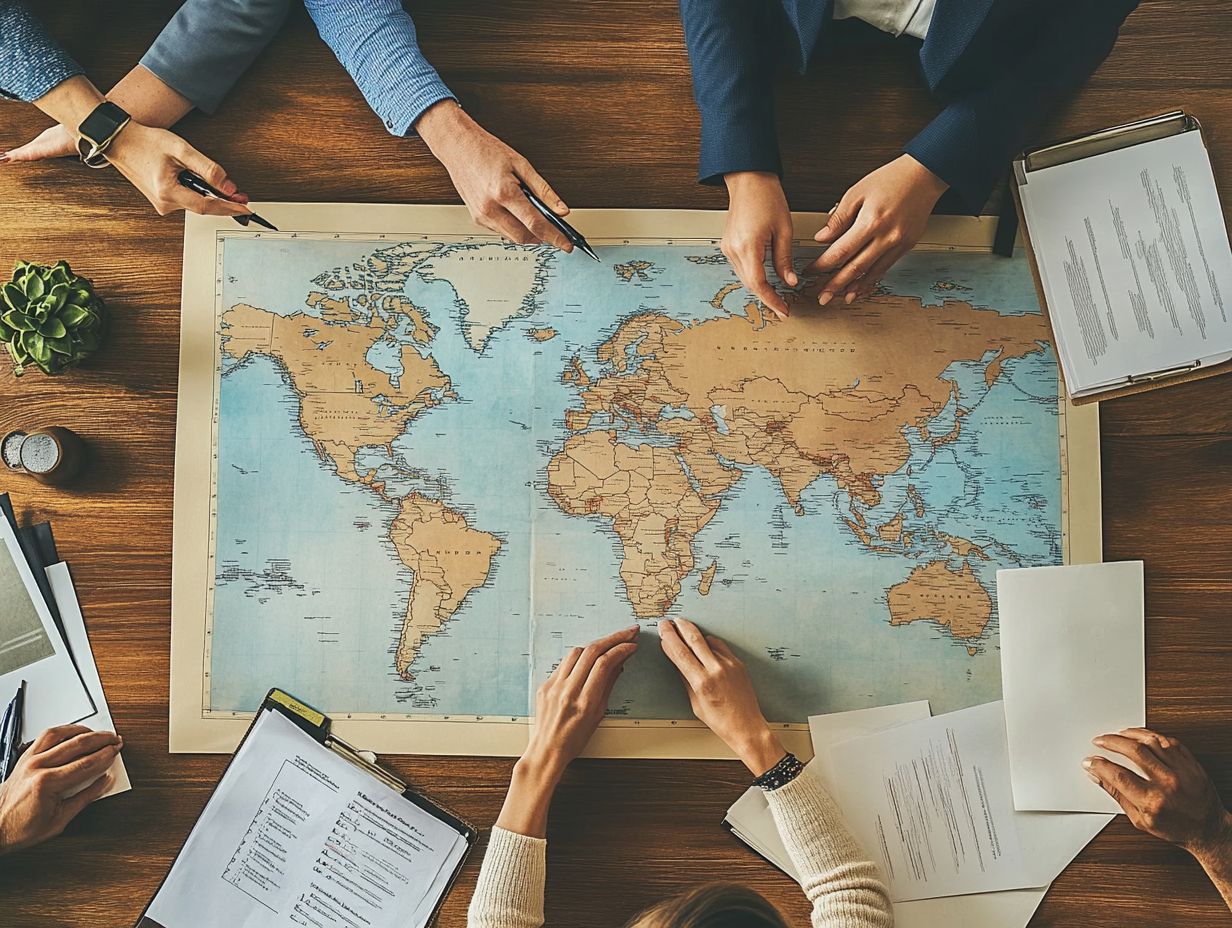How to Protect Your IP Internationally?
In today’s increasingly globalized world, protecting your intellectual property (IP) has never been more essential.
This guide will take you through the fundamentals of IP, helping you grasp its significance and explore the various types of protection available, including patents, trademarks, copyrights, and trade secrets.
You’ll discover key international IP laws, practical steps to safeguard your creations in foreign markets, and valuable tips for navigating the digital landscape.
Whether you re a business owner or an innovator, this information will empower you with the knowledge needed to effectively protect your intellectual assets on a global scale.
Contents
- Key Takeaways:
- Understanding Intellectual Property (IP)
- Types of IP Protection
- International IP Laws and Treaties
- Steps to Protect Your IP Internationally
- Working with International IP Lawyers
- Tips for Protecting Your IP in the Digital Age
- Frequently Asked Questions
- What is Intellectual Property (IP)?
- Why is it important to protect your IP internationally?
- What are the different types of IP?
- How do you protect your IP internationally?
- What are the potential risks of not protecting your IP internationally?
- Where can you seek help for protecting your IP internationally?
Key Takeaways:

Understanding the value of Intellectual Property (IP) and its global significance is crucial for successful international business.
Properly researching and registering your IP in target countries is essential for protecting your rights and preventing infringement.
Work with experienced international IP lawyers and implement strong cybersecurity measures to safeguard your IP in the digital age.
Understanding Intellectual Property (IP)
Grasping the intricacies of Intellectual Property (IP) is essential for you as a business owner or creator, as it includes legal rights designed to protect your inventions, brands, and creative works.
This legal framework features patents that protect your inventions, trademarks that safeguard your brand identity, copyrights that secure your creative works, and trade secrets that keep your confidential business information safe.
In the United States, the United States Patent and Trademark Office (USPTO) is instrumental in granting these protections, enabling innovators like you to safeguard your unique contributions.
Make IP protection a priority to keep your creative edge.
Protecting your IP fuels innovation and helps you flourish in an increasingly competitive environment.
Definition and Importance
Intellectual Property (IP) encompasses the legal rights that give you, as a creator, exclusive control over your inventions and original works.
By securing these rights, you not only gain the motivation to invest your time and resources into developing groundbreaking ideas, but you also contribute to an environment that rewards originality.
For instance, a tech startup that obtains patents for its innovative software can prevent competitors from copying unique features, allowing it to maintain a competitive edge.
In the music industry, copyrights serve to protect artists’ compositions and enable them to earn revenue from their work. This system supports their financial stability and encourages further artistic expression.
These examples illustrate how effective IP protection is a critical catalyst for growth across various sectors, ultimately benefiting the economy as a whole.
Types of IP Protection
You ll find various forms of Intellectual Property protection, each designed to serve distinct purposes in safeguarding the interests of creators and businesses.
Whether it s innovations, branding, artistic expressions, or sensitive business information, each type plays a crucial role in ensuring that your intellectual assets are well-protected.
Patents, Trademarks, Copyrights, and Trade Secrets
Patents protect your inventions, trademarks safeguard your brand identity, copyrights secure your creative works, and trade secrets ensure that your confidential business information stays under wraps.
Each of these mechanisms is vital in the realm of intellectual property (IP) protection. For instance, patents grant you exclusive rights to your inventions for a specified period, enabling you to capitalize on your innovations and recover development costs.
Trademarks help establish brand loyalty by distinguishing your goods or services from competitors, much like the iconic swoosh of a well-known sports brand.
Copyrights protect your artistic works music, literature, and films by giving you control over how they are used and distributed. Trade secrets include the formulas, practices, or information that give your business a competitive edge, such as a secret recipe or proprietary process.
The United States Patent and Trademark Office (USPTO) is instrumental in the patent application process, guiding you through the often complex maze of requirements. By leveraging these various types of IP protections, you not only safeguard your innovations but also cultivate a distinct competitive edge in your market.
Don t wait start protecting your ideas today!
International IP Laws and Treaties

International Intellectual Property laws and treaties, including the Madrid Protocol and the Patent Cooperation Treaty, are instrumental in harmonizing IP regulations across borders.
These frameworks enable you, as a creator, to safeguard your inventions and brands in foreign markets, ensuring your intellectual assets are protected no matter where you choose to operate.
Overview of Major International Agreements
The Madrid Protocol and the Patent Cooperation Treaty are essential international agreements that enable you to register and protect your intellectual property rights across multiple jurisdictions.
By simplifying the application process, these agreements offer you a streamlined pathway to secure trademark and patent protections in various countries with just one application.
This approach saves you valuable time and resources and alleviates the complexities often encountered while navigating different national laws.
For businesses like yours aiming to expand brand recognition on a global scale, the benefits are significant.
You gain enhanced legal security against infringement and can manage your IP portfolio with greater efficiency.
As a result, you can confidently venture into international markets, assured that robust protection mechanisms are firmly in place.
Steps to Protect Your IP Internationally
To effectively safeguard your intellectual property on a global scale, it’s crucial to engage in in-depth market research, familiarize yourself with local laws, and understand how to register trademarks in foreign jurisdictions.
Research and Identify Potential Markets
Conducting thorough research to identify potential markets is essential for navigating the market landscape effectively and ensuring successful IP protection in foreign countries.
This process helps you pinpoint lucrative opportunities and sheds light on potential challenges that may arise across different jurisdictions.
By analyzing market demand and understanding cultural nuances, you can tailor your IP strategies to resonate with each region.
Assessing local competition through competitive analysis will provide valuable insights into how existing players safeguard their own intellectual property.
This knowledge enables you to identify gaps in the market, adapt your offerings, and fortify your IP rights more effectively.
Ultimately, this positions you to mitigate infringement risks with confidence.
Register Your IP in Target Countries
Registering your intellectual property in your target countries is a crucial step in securing your international trademark rights.
You can often streamline this process through mechanisms like the Madrid Protocol.
This treaty simplifies the application journey, allowing you to submit a single international application that covers multiple jurisdictions.
By leveraging this framework, you can save both time and resources, sidestepping the complexities of navigating each country’s regulations individually.
The United States Patent and Trademark Office (USPTO) plays an essential role in your journey, offering guidance and support throughout the application process.
They provide valuable resources and assistance, ensuring you grasp the necessary requirements and effectively maneuver through the intricacies of international trademark registration.
Enforce Your IP Rights

Enforcing your intellectual property rights in international markets demands a solid grasp of local laws, vigilant monitoring for infringements, and effective legal agreements to safeguard your trade secrets.
Navigating foreign laws can be challenging, but it’s essential for protecting your innovations and maintaining a competitive edge.
You need to establish a robust monitoring system to identify any unauthorized use and develop a proactive strategy for tackling infringements as they occur.
Collaborating with local legal experts can offer invaluable insights into the nuances of IP laws in specific regions.
Crafting meticulous legal agreements, such as non-disclosure agreements (NDAs), which are legal contracts that prevent others from sharing your confidential information, and licensing contracts is essential for ensuring confidentiality and protecting your intellectual assets from potential exposure or misuse in unfamiliar markets.
Act now to protect your IP! Understanding how to research IP laws in different jurisdictions and implementing the right strategies can help you secure your rights before entering new markets.
Working with International IP Lawyers
Collaborating with international IP lawyers is essential for navigating the intricate legal landscapes that come with protecting your intellectual property rights.
This strategic partnership ensures that your rights are safeguarded across various jurisdictions, allowing you to operate with confidence on a global scale.
Benefits and Considerations
The advantages of collaborating with international IP lawyers are numerous. They offer insights into local laws and help you navigate complex registration processes.
Additionally, they ensure compliance with international agreements. Their legal expertise proves invaluable when it comes to effectively mitigating risks associated with intellectual property disputes and infringement.
By providing tailored strategic advice, these professionals enable you to enhance your competitive edge while protecting your innovations.
When selecting an international IP lawyer, consider their experience with specific legal matters in different countries.
Also, evaluate their familiarity with specific industries and their approach to negotiation and litigation.
Effective communication and a solid understanding of your unique business objectives are crucial for establishing a successful partnership.
Tips for Protecting Your IP in the Digital Age
In today s digital landscape, safeguarding your intellectual property demands a comprehensive strategy. This involves implementing strong cybersecurity measures and employing proactive online protection tactics to ensure your innovations are well defended.
Cybersecurity and Online Protection
Implementing cybersecurity measures is vital for safeguarding your intellectual property from digital theft, unauthorized use, and potential infringements.
To establish robust defenses, adopt a multifaceted approach that combines both technical tools and strategic practices.
This means employing advanced encryption methods to protect sensitive data. Encryption is a way to scramble data so that only authorized users can read it.
Also, use secure access controls to limit exposure and regularly update software to eliminate vulnerabilities.
Create an incident response plan to quickly address any breaches that happen.
Continuous monitoring enables your team to detect unusual activities in real-time, ensuring you can take immediate action to mitigate risks and preserve the integrity of your valuable intellectual assets.
Frequently Asked Questions

What is Intellectual Property (IP)?
Intellectual Property (IP) refers to the legal rights granted to individuals or companies for their creative and innovative works. This can include inventions, literary and artistic works, designs, symbols, names, and images used in commerce.
Why is it important to protect your IP internationally?
Protecting your IP internationally is crucial for several reasons. It helps safeguard your rights and prevents others from using, selling, or profiting from your creations without your permission.
It also allows you to expand your business globally and maintain a competitive advantage.
What are the different types of IP?
- Patents: Protect inventions.
- Trademarks: Protect brand names and logos.
- Copyrights: Protect creative works.
- Trade Secrets: Protect confidential information used in business.
How do you protect your IP internationally?
There are several ways to protect your IP internationally. One way is to protect your trademark internationally by filing for patent, trademark, or copyright protection in each country where you plan to do business.
You can also utilize international treaties, such as the Paris Convention or the Madrid Protocol, to streamline the process of securing a patent in different countries and obtaining IP protection in multiple countries.
What are the potential risks of not protecting your IP internationally?
Don t risk losing your creations! Without international protection, others could easily steal your ideas and profit from them.
This can result in loss of revenue, damage to your brand and reputation, and legal disputes. It can also limit your ability to expand your business globally.
For personalized advice or more information on protecting your IP, contact us today!
Where can you seek help for protecting your IP internationally?
Need help protecting your IP internationally? Consult a lawyer who specializes in ideas, inventions, and creations, and learn more about the basics of international IP law.
You can also contact government agencies like the U.S. Patent and Trademark Office or the World Intellectual Property Organization. They offer guidance and resources for IP protection.






